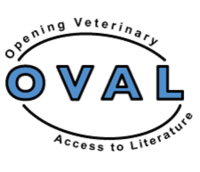OVAL
Introduction
The Opening Veterinary Access to Literature (OVAL) project involves the repackaging of currently restricted-view veterinary educational resources into an open format, which will then be made freely accessible to an international audience of veterinary online learners.
The project is funded by the JISC eContent programme 2011. It covers work over seven months and started in March 2011.
- Lead Institution: The Royal Veterinary College, University of London
- Project Partners:
You can visit the OVAL blog now too.
Project Description
Veterinary students and graduates have become increasingly confident in using web based resources to supplement or replace traditional approaches to learning. Whilst the convenience of e-learning has obvious attraction, there are also concerns with the academic quality of online information and how to search for it amongst the numerous other less reliable sources. The OVAL project will help to address these issues by adapting quality peer reviewed articles and datasheets provided by our commercial partners and integrating these in to the widely used WikiVet veterinary educational portal.
Currently, there is an extensive range of veterinary literature produced by private sector publishers which has a limited readership due to the prohibitive costs. However, with the significant market changes associated with e-publishing, there is now a good business case for making some of these resources free to view. The OVAL project intends to use this opportunity to develop an innovative model for repurposing online journals and text books as Open Educational Resources (OER).
Project Outcomes
Below are links to the relevant pages created under the OVAL project with the help of CABI datasheets and the flashcard questions taken form the Manson self assessment books.
|
Articles from CABI datasheets in French (pdf format)
|
|
|
Updates
For more recent updates please visit our blog!
Nottingham student focus group July 12, 2011
Steering group meeting minutes:
21st April - Meeting with CABI representative
OVAL project staff members had a productive meeting with a CABI representative and here is a summary of what was agreed so far:
- CABI will provide a list of diseases that have been researched the most in the past twenty years and have suitable datasheets
- WikiVet will select diseases from that list to appropriately fit into WikiVet
- The 'new' information sheet within WV will be written/adapted
- CABI will provide abstracts of about 5 key references each for those new sheets (possibility to extend this to other WV pages has been mentioned)
- Small subset of these sheets (details to be confirmed, possibly 10-20) will be integrated either by part or whole into Wikipedia as a test run to enhance traffic to both CABI and WV sites
- CABI may be asked to try to obtain permission from authors to use selected images (details to be confirmed)
- CABI will invoice the RVC for their time spent on this work
15th April - Second Project Advisory Group meeting
Current status of the project was discussed, any issues raised and next steps planned. For more information see meeting minutes.
30th March - JISC eContent programme 2011 meeting
The project manager and officer attended the JISC eContent programme meeting and left with a better understanding of how the OVAL project fits within the greater scheme of things. The variety of other projects funded by the same programme was very impressive and the whole event was very informative and proved to be a success.
16th March - Project Officer met with CABI representatives
We discussed the selection of appropriate content currently provided by CABI and how best to adapt it for use within WikiVet. An initial work flow was agreed and will be tested soon.
28th February - First Project Advisory Group meeting
Project partners and members introduced themselves and explained what they should be able to contribute. Initial thoughts and ideas were shared and first steps to the collaboration were taken. Minutes of the meeting
| This project is funded by the JISC eContent programme 2011. JISC inspires UK colleges and universities in the innovative use of digital technologies, helping to maintain the UK’s position as a global leader in education. |

